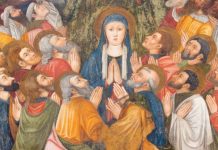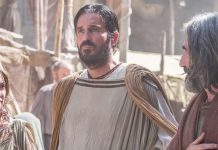
by Marian O’Brien, MTh
This Complete-A-Project Bible Search activity is for teacher and students (grades 4-6) working together. This Bible Search is based on John 21:1-19.
Background
* John 21:1-19 deals with the third post-Resurrection appearance of Jesus to his disciples. This background guide will deal with two important theological insights from verses 15-17.
* The first insight deals with one of the central themes in the Gospel of John: the importance of belief in Jesus. At the moment a person comes to believe, he or she passes from death to new life. The signs Jesus performs—like the miraculous catch of fish in this reading—help people come to faith. The emphasis the Gospel of John places on coming to faith in Jesus as the basis for new life in him helps us draw meaning from what Jesus says and does in these verses. We pay particular attention to the meaning of the phrase “Feed my lambs.” While Jesus certainly stressed service to the poor, “feeding his lambs” is not limited to feeding the body. It also refers to feeding others spiritually.
* The second insight deals with Jesus asking Peter if he loves him. This is one of those cases when knowing about the original Greek wording of Scripture can help us understand what takes place. English has one word for “love”; Greek has five, and each word conveys a specific kind of love. Two different words for “love” are used in verses 15 to 17: agape (unconditional love) and philios (brotherly love).
* The first time Jesus asks Peter “Do you love me?” he uses the word agape. He is asking Peter if he loves him unconditionally. Peter answers, “Yes, Lord, I love you,” but he uses philios—as if to say, “I love you like a brother.” The next time Jesus asks, he uses agape again. Again, Peter responds using philios. The last time Jesus asks Peter, Peter gets very upset. This is why knowing the Greek is so important. The third time Jesus asks Peter if he loves him, he also uses the word philios. Jesus understands that Peter is not able to say he loves Jesus unconditionally—after denying him three times on the night he was arrested. People often believe that Peter is upset because Jesus asks him the same thing three times. It is obvious now that Jesus’ acknowledgment of the limitation of Peter’s love for him contributes greatly to Peter’s distress.
* Despite Peter’s imperfect love, Jesus still finds him a suitable leader for his Church and entrusts him with the task of spiritually feeding his people. Peter himself will continue to grow in faith and later prove his unconditional love for Jesus by his own death one day on a cross.
Answers: 1. going fishing 2. no 3. “Children, have you caught anything?” 4. the disciples caught a great many fish 5. the disciple whom Jesus loved 6. he wanted to cook breakfast for the disciples 7. no 8. three
—Guide and activity sheet by Marian O’Brien, MTh. Art by Ansgar Holmberg, CSM.
MATERIALShttps://www.catechist.com/admin/article_edit.php
Copies of the activity sheet [CLICK HERE]
Bibles (The Search is based on the New American Bible.)
Pencils or pens
PROCEDURE
1. Have a student read aloud the story of “Loving God the Most.” Then ask students these questions: Why was David upset when he thought he had to love God more than he loved his parents? What did his mother say about loving God that made him feel better?
2. Tell students that today’s Gospel is about an exchange Jesus has with Peter about love. Share some of the information from Background about the different words for “love.”
3. Have a student read John 21:1-19. Before answering the questions on the activity sheet, remind students of how Peter had bragged at the Last Supper about how loyal he was to Jesus and how his faith would never be shaken (see Mark 14:29). But later that same night, after Jesus was arrested, Peter was afraid he would be arrested, too—so he denied even knowing Jesus.
4. Ask students to think about how they might feel if one of their friends pretended not to know them in order to make an impression on someone else. Could they understand why one of their friends might do that? Could they forgive this friend?
5. Tell students that Jesus loved Peter unconditionally and forgave him for what he had done. He also understood Peter; he knew that Peter would have a hard time forgiving himself. Jesus knows that it takes time and effort for us to get to know him. But, as with any relationship, the more time we spend getting to know Jesus, the more we love him. Encourage students to spend time in prayer talking to and listening to Jesus.
6. Have students close their Bibles and work individually or in pairs to answer the questions on the activity sheet. Then read the correct answers and let students see how many they got right. Have a student read what David learned about love (see the far right-hand panel on the activity page).
Copyright 2013, Bayard, Inc. All rights reserved. This article is protected by United States copyright and other intellectual property laws and may not be reproduced, rewritten, distributed, redisseminated, transmitted, displayed, published or broadcast, directly or indirectly, in any medium without the prior written permission of Bayard, Inc.
This article was written by the Catechist Staff and appeared in Catechist magazine, July 2013.
Image Credit: Brian A Jackson/Shutter Stock 145450387




